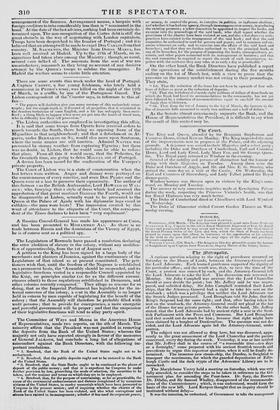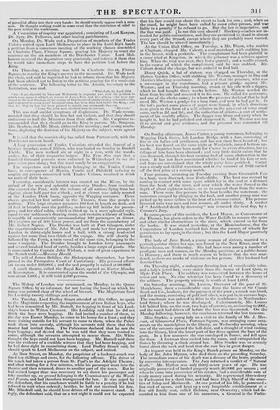tbr ifirtropaii4.
A curious question relating to the right of precedence occurred on Saturday in the House of Lords, between the Attorney-General and the Lord Advocate. Each learned gentleman supported the dignity of his particular office ; and the result was, that, to save the time of the Court, a protest was entered by each, and the Attorney-General left the Lord Advocate to take the lead. The discussion was renewed on Monday. Sir John Campbell was anxious that the Lord Chancellor should at once decide the point ; but Mr. Jeffrey said he was unpre- pared, and solicited delay. Sir John Campbell reminded their Lord- ships, that the Attorney-General had a right to take his seat on the woolsack ; which was a privilege that neither the Lord Advocate nor the Scotch Judges possessed. Lord Brougham told Sir John, that the King's Sergeant had the same right ; and that, after having taken his seat on the woolsack, the Attorney-General could not plead at the bar of the House for any private person. On the other hand, Mr. Jeffrey stated, that the Lord Advocate had by ancient right a seat in the Scot- tish Parliament with the Peers and Commons. But Lord Brougham said that would not do much for him ; because that right might have been claimed by a burgher of Dunfermline. The question was not de- cided, and the Lord Advocate again led the Attorney-General, under protest. The subject was not allowed to drop here, but was discussed, appa- rently to the great amusement of the Lord Chancellor and the parties concerned, every day during the week. Yesterday, it was at last settled that Mr. Jeffrey shall in the course of "a reasonable time—ten days or a fortnight," come prepared with his ancient Scottish records and precedents to argue this important question, when it will be finally de- termined. The immense new steam-ship, the Dundee, is freighted to transport the muniments, for which the guarded depositories of Edin- burgh Castle and the dark crypts of the Advocates' Library are to be ransacked.
The alarylebone Vestry held a meeting on Saturday, which was very fully attended, to consider the steps to be taken in reference to the Go- vernment plan for amending the Poor-laws. Dr. Spry, the Rector, Dr. Dibdin, and Sir Samuel Whalley, disapproved of the recommenda- tions of the Commissioners ; which, it was understood, would form the basis of the new bill. Lord Kenyon thought that an inquiry should be instituted without delay— It was the intention, he understood, of Government to take the management of parochial affairs into their own hands : he should warmly oppose such a mea- sure. lie thought nothing could he more cruel than the restriction of relief to the poor within the workhouse.
A Committee of inquiry was appointed ; consisting of IAA Kenyon, Dr. Spry, Dr. Fellowes, and other leading parishioners.. On Monday, Dr. Wade and a Deputation of members of the Trades Unions waited upon Lord Melbourne to place in his Lordship's hands a petition from a numerous meeting of the working classes assembled in Charlotte Place, Fitzroy Square, praying his Majesty to remit the sentence on the six members of the Dorchester Union. Lord Mel- bourne received the deputation very graciously, and interim d them that he would take immediate steps to have the petition laid before the King.
On Thursday, a meeting was held in Charlotte Stic et, Fitzroy Square, to receive the King's answer to the memorial. Dr. Wade took the char, and said he regretted he had to inform theta that his Majesty had been advised not to listen to the petition praying for 0 e remission of the sentence. The following letter to Mr. Austin, Sec] etury to the Institution, was read.
"Whitehall, 2.1 April l834.
" Sir—I am directed by Viscount Melbourne to acquaint you. that the petition to which your imme is affixed, in Favour of .lantes Brio and five others, Otto were con- victed at the last Sessions of the county of Dorchester of administering unlawful niths, and sonteneed to seven years' transportation, has been duly laid [Alba the King ; :had that his Majesty has not been pleased to signify any commands theieou.
" 1 inn, Sir, your most obedient humble servant. " [Iowan."
This was read amidst symptoms of displeasure. Dr. Wade.recom- mended that they should be firm but not violent, and that they should endeavour to hurl the :Ministers from their offices. Mr. Carpenter re.. commended that tin y should go to the King in person. Mr. Simpson, Mr. Benhow, and Mm'. Moat, addressed the meeting; and strong resolu- tions, deploring the decision of his Majesty on the subject, were agreed to.
It is said that the convict-ship has sailed from Portsmouth, with the Dorchester men on board.
A lung procession of Trades Unionists attended the funeral of a brother member, named Hilton, who was buried on Sunday in Bunhill Fields. The men walked six or eight in a row, with the wands, sashes, &c. of their respective lodges. The True Sun says that a hundred thousand persons were collected in Whiteehapel to see the procession pass along ; but this must surely be an exaggeration.
The carpenters and bricklayers belonging to the Trades Unions have, in consequence of Messrs. Combe and Delafield refusing to employ any person connected with Trades Unions, resolved to drink no more of their beer.
Yesterday, considerable interest was created on the River, by the arrival of the new and splendid steam-ship Dundee, from Scotland. She entered the Pool, with the colours of all nations flying from her rigging, about half-past ten o'clock ; and at eleven was safely moored at the London Dock buoy, opposite the Wapping entrance. Three cheers greeted her first arrival in the Thames, from the people in waiting. This large steamer measures 180 feet in length on deck, and 51 feet in breadth over the paddles ; makes up 107 berths for passen- gers ; and her chief cabin, which is fitted up in a most splendid style, equal to any nobleman's drawing room, and contains a library of books, is capable of conveniently accommodating 100 passengers at dinner. Her engines are of 300 horse power, and are from the manufactory of Mr. Robert Napier. The Dundee was built at Port Glasgow, under the superintendence of Mr. John Wood, and made her first passage to London in thirty-eight hours and a half; with a strong head-wind against her more than two. thirds of the voyage. She will shortly be followed by the Perth, a twin vessel of the same size, belonging to the same Company. The Dundee brought to London forty passengers and several hundred head of cattle, besides a large cargo of goods. She is commanded by Captain John Wishart, a man of great experience in the Scotch trade.—Morning Herald. .
The will of James Biddies, the Bishopsgate shoemaker, has been proved iu the Prerogative Court of Canterbury. His personal effects are sworn under 100,000/. ; and the real property is valued at 60,0001.
A small theatre, called the Royal Kent, opened on Easter Monday at Kensington. It is constructed upon the model of the Olympic, and cost about 1500/. ; it will hold 2,000 persons,

















 Previous page
Previous page